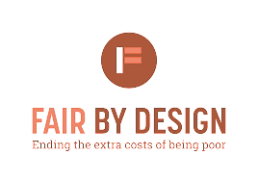4in10 Newsletter 09/12/21
4in10 Newsletter with data, reports, research, job vacancies, funding oopportunities and more. To read this issue click here. To receive the newsletter fortnightly straight to your inbox, join 4in10, London's child poverty network. It is completely free and gives advance notice of training and events and much more.
Timewise Video on Flexible Working
Timewise Webinar
Can flexible working help towards supporting low paid workers to progress and move out of poverty? Presenting the flexible working index and a discussion about flexible working as a real alternative.
https://timewise.co.uk/article/flexible-job-index-2021-a-timewise-roundtable/
Putting the onus on employers to enable all jobs to be flexible and for flexibility not to be a barrier to progression or keep people (mostly women) trapped in low paid work.
Fair By Design Blog. Innovation, fairness and a just transition to Net Zero
Fair By Design – The Poverty Premium.
Martin Coppack is Director at Fair By Design and Carl Packman is Head of Corporate Engagement and this article originally appeared on the Social Market Foundation website.”
By their very nature, essential services such as energy, credit, and insurance, are needed by everyone. However, these markets have been designed in a way that results in many people being treated less fairly. As Fair By Design’s research shows, poorer people pay more for products and services than those who are better off – known as the poverty premium.
The University of Bristol found that the poverty premium affects almost every low-income household, costing an extra £490 a year, on average. Low-income households experience the poverty premium in the energy market in a number of ways. They may use pre-payment meters for domestic fuel rather than paying by direct debit, or may prefer to pay on receipt of a bill to help manage a budget. Many low-income households are also not switched to the best fuel tariffs, which is also a poverty premium. These households are less likely to switch sometimes because they have other more pressing issues to deal with, which manifests in less capacity to engage in the market, which is known as the ‘scarcity mindset.’[1] It is not the same as consciously avoiding actions that might upset tight financial control, such as switching providers. They also may not be able to switch because of higher rates of digital exclusion, owing to a lack of ability or equipment to go online.
Research commissioned by Fair By Design found that people with certain protected characteristics are more likely to be paying a poverty premium, even when compared with low-income households as a whole. People from Black, Asian, and other ethnic minority households are more likely to be paying extra costs for energy, and paying on receipt of a bill, rather than by direct debit, which is usually cheaper. Single parents are more likely to pay for energy through more expensive prepayment meters. These groups are more likely to be in low-paid or insecure work and therefore need flexible payment methods to help keep control of their finances. Disabled people are more likely to be paying by either of these methods, than non-disabled people.
The poverty premium is particularly pertinent at the moment since poorer households suffer disproportionately in hard times. There are now millions more people facing economic hardship as a result of the pandemic. The ongoing gas price crisis means that the cost of heating the average home could also double.
Why does the poverty premium exist?
Essential products and services are too often designed for ‘super consumers.’ These are people who never become ill, always have a steady income, are able to understand complex terms and conditions and always have the time and technology to easily find the best deal. This is not a reality for everyone. There is a disconnect between social and regulatory policymakers and people’s lived experiences of poverty and exclusion, and a belief that a market based on competition benefits all consumers. In practice, firms compete for the most profitable and engaged consumers. It means that for many people products and services do not meet their needs or even that they are excluded altogether.
Inclusive Design: Understanding how different groups and consumers experience products
Across essential services regulators, inclusive design is increasingly recognised as a way to ensure markets are fair and inclusive, especially for consumers in vulnerable circumstances and on low incomes.
Inclusive design is a toolbox that helps design products and services that are accessible to as many people as possible. It is different to ‘traditional’ market research in that it is not simply about testing pre-existing solutions and hypotheses. It starts by talking to people with additional needs to understand the problems from their perspective, and designing from there. Rather than shaping the consumer around the product or service, firms start with people where they are, and co-design with them. This is especially important as the energy system becomes increasingly digitised, and we transition to net zero.
Instead of designing for a mythical ‘average’ user, firms should therefore understand people’s actual experiences and how these might put them at a disadvantage. In other words, what are they vulnerable to, and why?
There are huge benefits to firms from adopting an inclusive design approach. By involving customers in the process of product design and development, it increases the likelihood of adoption, and reduces the need for solving problems after they occur, through customer service, for example.
The role of government and regulators
At the same time we know that firms will only design inclusively, to a point. There are always going to be some consumers that are deemed less desirable and for whom competition alone will not help. Markets need to be regulated to serve everybody. This means that Government (BEIS) and regulators (Ofgem) should not only be encouraging firms to design inclusively, they should be applying inclusive design principles to their own work. They should shape their own policies around the consumer, especially those most vulnerable and least heard – rather than trying to make such consumers fit their desired regulatory intervention. It is not enough to rely on competition and the belief that empowered consumers drive the market.
For instance, consumers have a role in designing the appropriate policy steps towards decarbonisation. This is very important, since we need to ensure that the cost of the transition to renewable energy sources is not placed disproportionately and unfairly on low income groups. Although many UK households are reportedly willing to accept some increase in their bills to help finance the future energy transition, this will not be possible for all households – particularly those with little slack in their existing household budgets, or who do not own their own home.
Ofgem and BEIS should adopt an inclusive design approach to understanding the needs of all consumers (particularly those on low incomes) and use this approach to help set their priorities, develop and implement interventions, and assess their effectiveness. This means doing things differently, and engaging with low income people directly – placing them at the heart of decisions.
To help with this, Fair By Design, along with our partners Money Advice Trust, has published a practical guide on what inclusive design means and how it can be incorporated into the work of regulators.
The future of price protections
An inclusive design approach to policymaking will help identify where the limits are for the market serving certain groups of consumers, and for whom additional protections – such as price caps and targeted “social” tariffs – are needed.
In a Fair By Design study of low income households accessing Turn2us’ services, researchers compared the costs of the energy poverty premium in 2016 and 2019 to assess the degree to which the retail energy market has changed. [2] While their findings showed the positive impact of regulation, low-income consumers still face excess costs for their energy.
For example, the gap between the Standard Variable Tariff and the best online-only fixed tariff had reduced from £317 in 2016, to £213 in 2019, a reduction of over £100. [3] The gap between the best pre-payment meter tariff and the best online-only fixed tariff had almost halved, dropping from £227 in 2016 to £131 in 2019.[4] This shows a strong correlation between price protections and a reduction in the poverty premium.
This is very welcome news and shows that sensible regulation and a focus on price to protect consumers is achieving good outcomes. The focus now should be on how to narrow the gap even further, to entirely remove the poverty premium, through a combination of inclusively-designed innovations and policy changes.
About Fair By Design
Fair By Design is dedicated to reshaping essential services, such as energy, credit and insurance, so they don’t cost more if you’re poor. People on low incomes and in poverty pay more for a range of products including energy, through standard variable tariffs; loans and credit cards, because of higher interest rates; and expensive insurance premiums, by living in postcodes considered higher risk. This is known as the poverty premium.
We collaborate with industry, government, and regulators to design out the poverty premium. Our Venture Fund provides capital to help grow new and scalable ventures that are innovating to make markets fairer. The Barrow Cadbury Trust runs our advocacy work, and Ascension manages the Venture Fund.
To download the Fair By Design and the money Advice Trust guides on inclusive design visit: https://fairbydesign.com/inclusive-design/ There is one for regulators (and social policy makers) as well as one for firms.
Notes
- [1] Scarcity: The True Cost of Not Having Enough, Sendhil Mullainathan & Eldar Shafir (2011)
- [2] Although average figures of the poverty premium are not comparable across the two studies, due to differences in methodology, the calculation of the premiums remained the same and so costs are comparable.
- [3] Drawn from the average across Big 6 suppliers and across household size.
- [4] Drawn from the average across Big 6 suppliers and across household size.
Camden Federation of Tenants Briefing for VCS's
Background
There is a greater focus on the private rented sector (PRS) than ever before, but because of the media’s excessive interest in so-called “Generation Rent” there is a misconception that most people who live in it are mostly students and highly paid young professionals.
While a significant number of both of these groups rent privately across London, it would be wrong to assume that all of them are well off. Increasingly, the PRS is now made up of a mixture of household types and recent research carried out by the University of York* identified these six as being the most “vulnerable to harm” in the PRS.
1. With dependent children
2. With someone registered as disabled or who is unable to work due to a long-term sickness or
disability
3. With someone aged 65 or older
4. In receipt of a means tested benefit or tax credit
5. On a low-income but not receiving any means tested benefits or tax credits
6. Headed by a recent overseas migrant
*Vulnerability amongst Low-Income Households in the Private Rented Sector in England (David Rhodes and Julie Rugg, University of York Centre for Housing Policy, 2018)
The impact of Covid-19
According to the Greater London Authority’s “Housing in London 2020” report:
“The onset of the Coronavirus pandemic highlighted and exacerbated existing inequalities in London's housing market, including stark differences in the prevalence of housing problems between Londoners of different ethnicities.” The report also highlighted private renters increased financial vulnerability compared to homeowners, and the lack of access to private or shared gardens.
We would also add to this the difficulties of social distancing in shared housing arrangements, particularly in HMO (Houses in multiple occupation) type accommodation, the behaviour of landlords/agents, and because of a power imbalance, the inability of renters to challenge or influence this.
Some private rented sector facts
1. In 2019, 29% of London’s households were private renters and 23% were social renters, making it now the smallest housing tenure in the city. This trend will continue as the housing crisis only gets worse
2. A bigger proportion of homes rented privately (35%) have children living in them than in the social rented sector
3. Average private rents in London have risen by 43% since 2005, and in 2015/16 around a quarter of privately renting households in the capital spent over half of their income on rent.
4. The average rent for a 1 bedroom flat in London is more than a 3 bedroom flat anywhere else in England
Tenants or renters ?
For many years, any discussion about the private rented sector was on issues solely relating to tenants, but recently this has changed to focus more on what are now called “renters”. This is largely due to the much broader range of terms that people rent properties under e.g. a licence rather than a tenancy for a lodger or property guardian, a holiday let or lettings club arrangement or no formal agreement at all. It should also be pointed out that these sorts of practices tend to proliferate in the more marginal (and often hidden) parts of the sector, where the households more vulnerable to harm tend to live.
In what ways are social renters and private renters different ?
Private renters do not have a designated housing officer that can inform or signpost them to the appropriate local organisations, services and projects
Private renters do not live in clearly identifiable estates or blocks (unless they are living in an ex-Council property) and are much more dispersed across an area than social renters
Private renters are unlikely to be aware of the tenant halls on Council estates and the events/activities that take place in some of them
Research has shown that private renters don’t tend to do the things that more settled parts of the community do such as register to vote, sign up to doctors and dentists etc
What kind of issues are private renters currently facing ?
Poverty/fuel poverty – Due mainly to unaffordable rents, Covid-19, and energy inefficient homes.
This can also be due to the inability to choose their own energy supplier, benefit changes and a reluctance to claim benefits amongst certain groups e.g. older renters
Isolation/loneliness – Is also a particular problem amongst older renters and is made worse by the often individualised nature of renting in the PRS
Physical/mental health issues – Can be pre-existing or new conditions that are either made worse or caused by poor a relationship with landlords/agents and the lack of adapted homes in the PRS
Digital exclusion – Is a particular issue for those who cannot afford a smart phone or broadband and/or don’t understand how to get online
Lack of knowledge of rights – Is an ongoing problem amongst most renters, but can be a particular problem for certain groups e.g. those from other countries who are not familiar with how “the system works” here
What does this mean for the voluntary and community sector in London ?
We believe that the rapidly changing nature of who lives in the private rented sector has implications for voluntary and community sector organisations across the capital when it comes to both running and promoting existing projects and services, and planning new ones. It should also be noted that the disadvantaged households described here are those that local groups/organisations usually focus on.
How should the voluntary and community sector respond to this ?
We believe that when planning, running and promoting projects and services it is helpful to:
Think about housing tenure and understand the range of issues that private renters currently face
Understand the differences between social and private renters and not just view them as generic
“residents”
Understand how they find out about, access (or not, as is often the case) local projects and services
Produced by: Camden Federation of Private Tenants (CFPT)
Tel: 020 7383 0151 Email: admin@cfpt.org.uk Website: www.cfpt.org.uk
4in10 & GLA Poverty Research Published 11/10/21
Flying Against Gravity
A dynamic piece of new research into the lives and aspirations of those on low income and living in London. The research is a joint initiative between 4in10 and the GLA commissioned to coincide with start of London Challenge Poverty Week 2021. View the full report here.
LONDON CHALLENGE POVERTY WEEK - EXCITING UPDATES.
LONDON CHALLENGE POVERTY WEEK.
WHAT, WHERE AND WHEN.
Excitement is building as London Challenge Poverty Week approaches. Running from the 10th to the 17th October this is the annual opportunity to bring the dreadful impact of poverty to the fore in London.
The Launch Event on the 11th October will feature the findings of research carried out by 4in10, The GLA and ClearView Research on Londoner’s Attitudes to Poverty. Flying Against Gravity.
There is an in-person Child Poverty Summit organised by The Childhood Trust and London Child Poverty Alliance and so much more.
It is fantastic to see the hard work that goes on all year round being highlighted. Events happening locally could not be more diverse, which reflects the strength of our network and the determination of our sector:
- Adanna Women’s Project in Redbridge are running an event for black girls aged 13-16, aimed at building confidence and improving skills.
- ATD 4th World are running two poetry events one live in Brixton and one online.
- Barking and Dagenham Youth Dance have written and choregraphed a 3 minute video about their feelings about the impact of poverty on families.
- Bin Knives Save Lives, Ilford are holding an awareness event highlighting the link between poverty and knife crime.
- Brite Box Project/Voices of Hope, Kingston are hosting a Sunday ‘banquet’ to draw attention to their food delivery programme and to gain more local support.
- Broad Bikez Hackney are running a session of free bike DIY helping people learn how to mend their own bikes
- Commission on Social Security are presenting their report on what is wrong with the current system and how to put it right.
- Gingerbread are producing some beautiful infographics about the impact of poverty on lone parents.
- Home Start Ealing are running a food and nutrition event for some of the many young families they support
- Jade Mutua Foundation in Brent are running two events one to attract local businesses and volunteers to support their work and the other a family fun day to promote their services.
- Just Fair and the Social Rights Alliance are running an online session on using human rights as a tool to tackle poverty.
- Lewisham Local with Afril, Wild Cat Wilderness and other community gardens in the borough are running 5 workshops on gardening, foraging, campfire cooking, and pizza making, with a focus on Holiday Hunger.
- Poplar HARCA are promoting a food drive in Tower Hamlets during the week.
- Red Roots Incubator in Hackney are running a young people’s event, ‘Unite4Change’ involving young people’s local focus groups, showcasing creative talents and solidify pathways to empower future success.
- Resources for Autism are hosting a webinar on the hidden costs of bringing up a disabled child.
- Restorative Justice for All in Southwark will be running online youth-led campaigning activities focusing on young people, mental health and health inequalities and a linked ‘youth walk.’
- Solace Women’s Aid are holding art activities in all of their London refuge’s to highlight children’s feelings about poverty and inequality.
- St Michael’s Fellowship in Lambeth are creating a podcast specifically about young fatherhood and poverty, and asking parents to produce some poetry or artwork and create some social media content.
- Sustain are running two food poverty online events. One on the Healthy Start scheme and the other on how local collaboration can help tackle food poverty and move towards food justice for all.
- Universal Ease to Redress in Islington are holding a week of open days focussing on volunteering and food provision.
Local Authorities, The GLA, Trust for London and London Councils are all involved in supporting events and it is great to see that some local MPs are taking the time to visit participating organisations to learn more.
New events are being listed all the time so keep an eye on the LCPW website for more updates and please do try to sign up for anything that interests you.
Universal Credit Cut. A Letter to MP's
Sutton Voluntary Sector have sent a jointly signed letter to their MP's to detail exactly what the cut to Universal Credit will mean locally. They have suggested sharing it for anyone to adapt to their locality. Thank you to Steve from Sutton CAB for this:
Dear MP's Name
Universal Credit
As you will recall, we have previously exchanged correspondence and had a useful meeting about the ending of the Universal Credit Coronavirus uplift. Over the last few weeks, there has been a lot of media coverage and commentary about the issue. There is a lot of concern among staff and volunteers in Sutton voluntary sector organisations about how the ending of the uplift will impact on Sutton residents. I am writing on behalf of the Sutton voluntary sector organisations listed at the bottom of this letter. We all have concerns about the £20.00 per week reduction in Universal Credit; concerns that recently have been exacerbated by the impending increases in fuel costs and food price inflation.
We would be grateful if you would consider asking the government to reconsider its decision to end the uplift. We hope that the information below, about the impact of the reduction in Sutton and the Universal Credit regulations will be helpful to you.
There were, according to official DWP figures, 15,493 Sutton households ‘on’ Universal Credit as of May 2021..
The government increased the Universal Credit ‘standard allowances’ in 2020 in response to the Coronavirus pandemic. A monthly ‘standard allowance’ is included in the calculation of every UC claim. There are different standard allowances for people for single people, couples and people under and over the age 25. The standard allowances are, as you can see from this table, quite low.
| Standard Allowance | Current Rate | Rate from 6th October 2021 |
| Single under 25 | £344 | £257.33 |
| Single 25 and over | £411.51 | £324.84 |
| Couple under 25 | £490.60 | £403.93 |
| Couple aged 25 or over | £596.58 | £509.91 |
We can illustrate the impact of the Universal Credit reduction with an example calculation. The client is an illustration, but the calculation is based on actual Universal Credit amounts.
The claimant is a lone parent with one daughter aged 14. Her current ‘maximum amount’ of UC for is £694.01 per month (plus housing costs). This maximum amount is comprised of the £411.51 standard allowance and the Child Amount of £282.50.
The claimant works part time. She earns £520 per month (net). The calculation of her UC includes a ‘work allowance.’ She can earn £293 per month without her UC being reduced. She has earnings of £227 over her work allowance. Every £1.00 of earnings over the work allowance reduces Universal Credit by £0.63 – i.e., earnings ‘taper’ UC entitlement at 63%.
The calculation of her UC entitlement compares her maximum UC - £694.01 (plus housing costs) with her income. She is treated as having income of £143.01 (63% of net earnings minus the work allowance). She is therefore entitled to UC of £551 per month, plus housing costs. Child Benefit is paid in addition to Universal Credit.
From 6th October, the claimants maximum Universal Credit is £607.34. This is comprised of £324.84 standard allowance and Child Amount of £282.50. She will then be entitled to UC of £464.33 (plus housing costs). This is a reduction of £86.67 per month.
As you can see from this example, Universal Credit is reduced by £0.63 for every £1.00 of earnings over the work allowance. Only people responsible for a child or people with a limited capability for work have a work allowance. Other people such as those without dependent children and carers (who do not otherwise qualify) do not have a work allowance.
Most claimants cannot therefore make up the £86.67 per month shortfall by working additional hours. If the claimant in the above example increased her working hours and therefore her net pay by £86.00 per month, she would lose £54.18 from her Universal Credit, meaning that she would, despite earning £86 more per month, only gain £31.82 per month - so the claimant can clearly not make up the £86 per month reduction in benefit by earning an additional £86 per month.
Many people in receipt of Universal Credit do not have any realistic way of making up for the £86 per month reduction at all. Some 60% of people in receipt of Universal Credit are not in employment. People may for example have a limited capability for work, be caring for a severely disabled child or adult or be a lone parent with a young child. Some people in receipt of Universal Credit are working full time (and need the benefit to help with rent), so cannot further increase hours and therefore cannot, in any way, make up the reduction. We would like to stress, that even if people can increase their earnings, those earnings will reduce Universal Credit by £0.63 for every £1.00 of earnings.
You can see, from the above table, that the Universal Credit standard allowances are quite modest. The standard allowances are the basic entitlements for single people or couples. Although these allowances are not designed to cover rent or council tax and claimants may also receive amounts for children, caring responsibilities and having a ‘limited capability for work- and work-related activity,’ the amounts are very low when compared to the ‘Standard Financial Statement’ ‘Trigger figures.’
Debt advisers, such as the Citizens Advice Sutton debt team use a Standard Financial Statement. The Standard Financial Statement includes ‘trigger figures’ The trigger figures are pre-agreed levels for certain areas of discretionary household expenditure. The trigger figures help identify levels of monthly expenditure deemed reasonable when completing the statement. Debt advisers do not need to explain the financial statement to creditors unless the trigger figures are exceeded.
The Universal Credit amounts are inadequate to allow claimants even the trigger figure amounts of discretionary expenditure. The Standard Financial Statement ‘allows’ a single adult to spend a total of £666 per month on ‘discretionary’ items – communications / leisure and groceries etc. However, the Universal Credit Standard Allowance for a single adult (over 25) is currently only £411.51 per month and is due to decrease to only £324.84 per month.
The Standard Financial Statement ‘allows’ a single adult with a dependent child to spend a total of £885 per month on ‘discretionary’ items. However, a single parent with one child could receive Universal Credit of no more than £648.59 per month (due to decrease to only £562.92 per month) plus Child Benefit of £21.15 per week. Even including Child Benefit, the family’s income would total only £740.24 per month, decreasing to only £654.57 per month in October.
Furthermore, many people in receipt of Universal Credit have a shortfall between their rent and the amount of housing costs included in their UC calculation – the Local Housing Allowance only covers the 30th percentile of local rents.
A very high proportion of Citizens Advice Sutton debt advice clients are in receipt of Universal Credit and have a ‘deficit budget’ – in other words, their incomes are inadequate to cover even essential expenditure such as rent, utilities and food.
We understand that the government introduced the £20 per week uplift as a temporary measure, in response to the pandemic. However, many people need to claim Universal Credit for the long term. As we have said above approximately 40% of Universal Credit claimants are in employment and need Universal Credit to help pay rent. Many of these people have not seen any improvement in their situation since the introduction of the uplift – in fact their financial positions may have deteriorated due to rising food costs and will deteriorate further with increases in fuel costs. The Citizens Advice Sutton debt team has seen an increase in demand in recent months.
We hope that this information is helpful to you. We would be grateful if you would ask the government to reconsider their decision to end the Universal Credit uplift – a decision that will have significant adverse financial consequences for over 15,000 London Borough of Sutton households.
Yours sincerely
Book Your Place - 4in10 Coffee Morning. Health Inequalities. 5th August 10am.
| Book A Coffee Morning Place! |
Thursday 5th August 10 - 11am
|
Have coffee with 4in10!
We are delighted to announce the launch of our new ‘4in10 Open Coffee Mornings’!
4in10 Open Coffee Mornings provide a free space for us all to listen, learn, connect, network, and voice concerns on a variety of topics related to child poverty in London.
4in10 Open Coffee Mornings are open to everyone. This includes 4in10 members, voluntary community sector organisations in London, those with lived experience, public sector workers and anyone who shares concern on issues relating to growing child poverty in our capital.
Launching with ‘Health Inequalities in London’ (5th August 2021 | 10:00 – 11:00), Open Coffee Morning sessions are thematic, meaning there is one overarching area in which frames the discussion. However, the sessions are truly flexible; attendees can contribute, participate, and engage in ways and on areas that matter to them.
4in10 is nothing without its membership. Some of our proudest moments at 4in10 have stemmed from shared ideas, cross-organisational collaboration and issue discussion amongst our members and voluntary community organisations. Our Coffee Mornings will provide a regular informal space for this to occur organically and more frequently.
The first Coffee Morning (Health Inequalities in London) is on 5th August, 10:00 – 12:00: sign up here
Sign up to the event to receive email notifications for the session, the ZOOM link, and information on future coffee mornings.
4in10 Coffee Mornings are held roughly every six weeks. Sign up to future sessions:
- 4in10 Open Coffee Morning: Benefits and Income – Wednesday 15th September (11am – 12am): https://www.eventbrite.co.uk/e/162051573619
- 4in10 Open Coffee Morning: Housing and Homelessness – Tuesday 30th November (10am – 11am): https://www.eventbrite.co.uk/e/162053060065
The following session will be at the end of January and the theme will be Family and Child Poverty in Outer London.
We look forward to seeing you there!
Blog Post from Alketa Hystuma of The Shpresa Programme
The Shpresa Programme works with Albanian nationals in the UK who have mainly migrated from Italy, Greece and Bulgaria. Their dual nationalities make them EU citizens.
The 23rd of June 2016 marked a seismic change for a country, which for 47 years was a member state of the European Union and its predecessor, the European Communities (EC). Assisting with the completion of online applications has been challenging since the Brexit process as many service users have difficulties with the language or have no English skills. Others have difficulties using computers and online services, like not understand the confirmation emails or calls they receive to provide further evidences as part of their EUSS applications. Many of the people we work with have completed wrong applications, equally many are not aware of their rights on public funds including housing and homelessness assistance. A general problem is that many do not yet fully understand what Brexit means and why having a Settled or Pre-Settled status is important in protect their future immigration status, as well as their rights and entitlements to family reunions, work, benefits, and access to the NHS.
Since COVID-19 we witnessed a rise of applications for universal credit. We’ve noticed indirect discrimination when an EU citizen has only arrived to the UK a few months ago and is working a limited number of hours per week. Most of the claims made resulted in refusals, not once, but 2-3 times. We have previously requested reviews and have appealed decisions to highlight that the EU citizens have the same rights as a British passport holder or someone with refugee status.
Our other immense concern is for groups or people who are isolated and have no contact with us or any other organisations who promote and do campaign work around the EU Settlement Scheme. If vulnerable members of our community fail to apply before June 30 2021 their immigration status will inevitably be compromised, no matter how long they have resided in the UK.
Our partnership with New Europeans UK started in September last year. Since then, we have jointly delivered more than 5 events and information sessions tailored for the Albanian community. New Europeans UK have advised and trained our staff, as well as a cohort of our Albanian speaking volunteers. We have found a valuable partner that is keen to hear the challenges our service users face and offer free professional advice.
It has been a highlight of Shpresa’s activity, to work intensively with the many EU citizens part of the Albanian community in the UK and raise awareness of their rights in the UK during and after Brexit. With the continuous support from New Europeans UK, the Shpresa Programme has campaigned extensively through social media, our digital work and information sessions, as well through our advocacy “Be the change” project. This will ensure effective support continues to reach our community, so that no EU citizen gets left behind. We will continue to assist anyone who needs help to integrate and become self-sufficient once they chose to make the UK their home.
Shpresa Programme
020 7511 1586
No Child Left Behind – new website! Blog by Mari Burton from the NEU.
New data released by the End Child Poverty collation has revealed that even before the pandemic child poverty levels had risen to 4.3 million children – an increase of 200,000 on the previous year, This means that across the UK, 31 per cent of children are now growing up trapped in poverty – the equivalent of 9 pupils in every class of 30.
It doesn’t have to be this way. The Government must take urgent action to right this wrong.
The National Education Union have launched a brand new campaign website which allows visitors to search for the latest child poverty statistics for their area, simply by typing in their postcode. Visitors to the site are asked to email their local MP, asking them to show their commitment to tackling poverty in their area by signing the NEU’s anti child poverty pledge. The pledge reads:
As a member of Parliament, I pledge to do everything in my power so that no child is left behind in East Worthing and Shoreham:
- I call for the development of a cross-Government strategy to eradicate the poverty faced by the 4.3 million children currently growing up trapped in poverty.
- I will use my vote and voice in Parliament to try to stop an expected 730,000 more children being plunged into poverty by 2024.
We must value and invest in all our children, so they are supported to learn, succeed, and go on to have bright futures.
Poverty is not inevitable – with enough political will we can eradicate it. At the time of writing 91 MPs from across the parties had committed to do everything in their power to leave no child behind – check if yours has signed up by visiting nochildleftbehind.org.uk and supporting our campaign!










